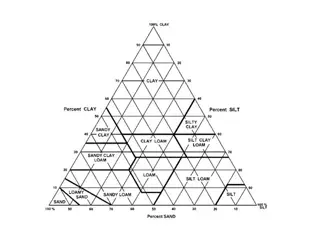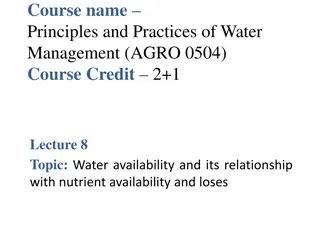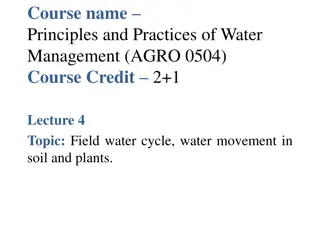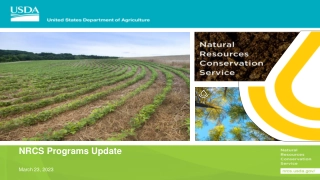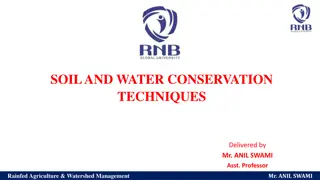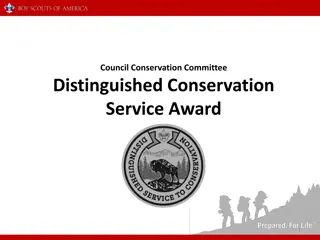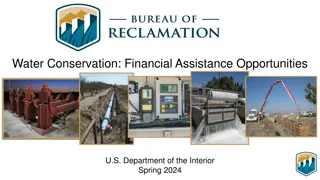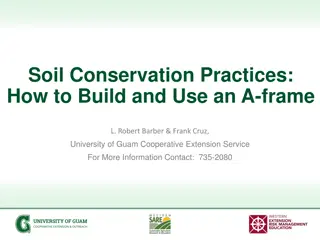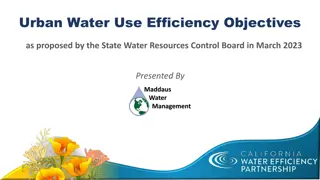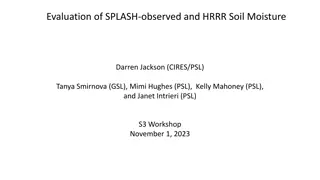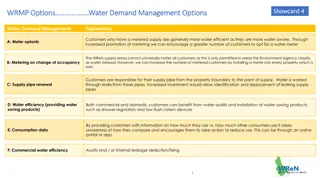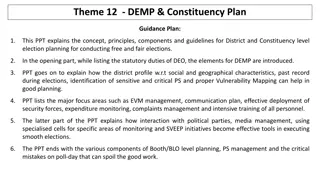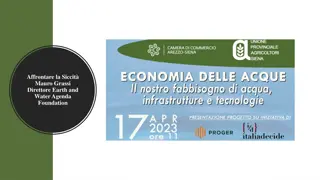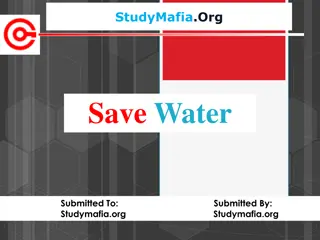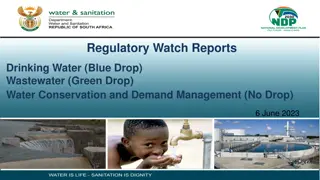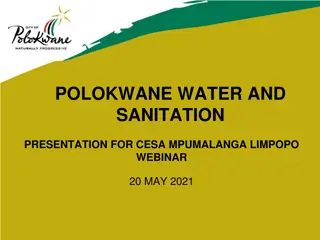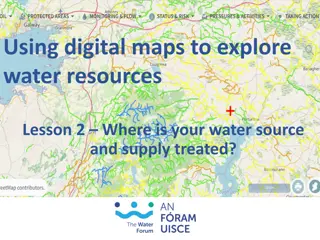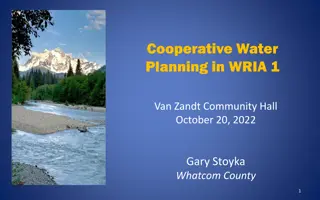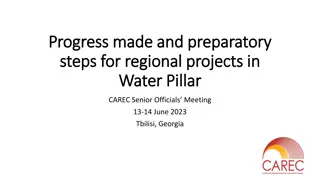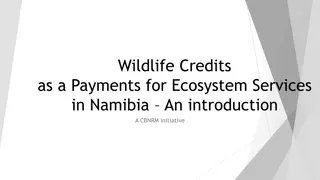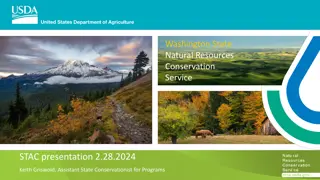Financial Management Processes of Soil and Water Conservation District Board
This training module focuses on the financial management processes of the Soil and Water Conservation District (SWCD) Board, emphasizing the importance of proper financial stewardship, transparency, and accountability. It covers key concepts such as financial powers of the district, fraud prevention, defensibility, and internal controls. The module also addresses common accounting issues and the role of SWCD board members in ensuring the district's financial integrity.
- Financial management
- Soil and Water Conservation District Board
- Transparency
- Accountability
- Fraud prevention
Download Presentation

Please find below an Image/Link to download the presentation.
The content on the website is provided AS IS for your information and personal use only. It may not be sold, licensed, or shared on other websites without obtaining consent from the author. Download presentation by click this link. If you encounter any issues during the download, it is possible that the publisher has removed the file from their server.
E N D
Presentation Transcript
TN Soil and Water Conservation District Board Training Chapter 2 Financial Management Processes of the SWCD Board
2.1 Financial Powers of the District 2.2 Common Accounting and Oversight Issues Table of Contents: 2.3 The Reconciliation Process 2.4 Invoices, Receipts, and Contracts
Key Questions to consider: Why is this training important? Do all board members and staff understand and use the current financial management system? Key Concept: 2.1 Financial Powers of the District Proper financial management is a group effort involving all district board and staff members and must be founded on basic guiding principles to achieve a satisfactory financial management process.
The Fraud Triangle 2.1 Financial Powers of the District Pressure Rationalization Opportunity
Defensibility: Adequately justify the expenditure of all funds awarded to the district from the government or obtained by the district from local sources. Transparency: Availability of the district s work and finances to all stakeholders and the public. Definitions and Concepts to know: Financial Stewardship: Responsibility of the financial well-being and decision processes/ resources of the district. Accounting Standards: Development of an appropriate system for financial record keeping and documentation that is in compliance with state laws and statutes. Internal Controls and Separation of Duties Procedures implemented to ensure the integrity of financial and accounting information, promote accountability and prevent fraud.
True or False Transparency is the availability of the district s work and finances to all stakeholders and the public.
Key concepts: 2.2 Common Accounting and Monitoring Issues As public officials, SWCD board members and staff are accountable for all funds, property, and equipment belonging to the district. Districts cannot operate without policies, procedures, and a board-approved accounting system.
Accounting and Monitoring: Districts cannot operate without funds of some kind either to assist famers/landowners with cost share funds, fundraising to support the annual banquet, annual report, field days/farm tours, equipment rental contracts, fund the district s operating expenses, and in some cases, pay their valued staff. Accountability is an obligation of the board which sets up a system of checks and balances and provides monitoring (oversight) to ensure good financial management. A SWCD should conduct monthly, detailed monitoring of all district bank accounts instead of waiting for scheduled state reviews. Employees of partner agencies such as USDA-NRCS, Farm Service Agency, TDA, etc., and staff working with but not employed by the district, must never manage nor reconcile district funds. Districts cannot operate without policies and procedures and a board-approved accounting system to assist in reducing the common accounting and monitoring issues that hamper district operations. Read below the common issues that appear from monitoring reviews, and how they can be addressed by the board members:
Pre-Signed Checks. There should be no pre-signed checks. No one will approve or sign a check for themselves. A double signatory check is the best practice. If it is not feasible to maintain dual signatures on all checks, having a policy set where dual signatures are required on checks over a set amount is a wise practice. The location and keeper of the checkbooks (account numbers) must be known by all supervisors and staff. Checkbooks must be safeguarded during office hours, and never be taken home. Recommended that checkbooks be kept under lock and key. Checks and cash received from participants must be deposited as soon as possible. establish a time period of 24-48 hours from receipt to deposit. The district board may choose to establish a petty cash fund. Financial reports of the district s finances at every meeting agenda of the board. Annual financial reports must also be submitted to the state per statute section 215(d). Per diem reimbursement forms require the examination of the monthly bank reconciliation and financial report.
Accounting and Monitoring Cont. The district treasurer, working with the District staff must maintain an accurate account of the financial transactions of the district and prepare reconciled monthly reports. Boards must develop a system of internal controls. Separation of the office and duties of the secretary and treasurer. It is unacceptable to have all aspects of a transaction be performed by one person. Make sure everyone on the board has a clear job description that defines their responsibilities. Draft policies that cover check signing, expense reimbursement, credit/debit card usage, petty cash, access to sensitive documents, etc.
True or False? Pre-signed checks are appropriate to use by district boards.
Key concepts: 2.3 The Reconciliation Process Accounting reconciliations or checkbook maintenance of all bank accounts should be done monthly. Reconciling financial accounts with accounting records will help the district identify errors, irregularities, needed adjustments and possible fraudulent activities.
The Reconciliation Process Reconciliation is the process of comparing a district s financial accounts/amounts with banking/financial institutions to ensure they add up and agree to the same total amount of money, or to explain any differences between the two. Keeping an accurate running balance each month: Maintain a paper check register/ a check register on the computer. * Online banking is NOT a substitute for the district maintaining a check register. Compare each transaction in the bank statement with the accounting records to ensure the correct funding code is used. Fees, interest income, interest expense, etc., entries will be added from the financial statement to the accounting records as reconciliation is completed. Maintaining an accurate check register is the first step to good reconciliation!
The Reconciliation Process Cont. Reconciliation informs the district which transactions have been entered but not yet processed by the bank. Reconciliation tells the board which transactions have cleared the bank, and which have not. All reconciliations, monitoring from TDA, and audit reports with findings* concerning state contracts should be part of the financial report given by the Treasurer at the next board meeting. *Findings should be part of the board meetings until those findings are resolved, approved, and entered into minutes. Then as a final action, the board should communicate to the TDA internal auditor how they were resolved. Bank reconciliations should have a preparer and an approver, who are two separate people, but these can be people with authority to sign checks. As a recommended best practice, reconciliation should be done by a person who is not maintaining the checkbook, to create a system of checks and balances.
The Reconciliation Process Cont. What to do if you find an error? A detailed narrative of an error should be included in the Board meeting minutes, with a copy of the documents involved. Errors should be marked out and the correct amount legibly entered with initials of the person(s) making the correction.
True or False Online banking can be used as a substitute to maintaining a check register.
Key Concepts: 2.4 Invoices, Receipts, and Contracts District boards need to have consistent and proper documentation of expenses. Proper use of Invoices, Receipts and Contracts contribute to the wellbeing of the district s financial systems.
Invoices Documents used by the district that outline a list of goods or services provided: Invoices may include: Invoice Number unique to each invoice, aids in matching payment with billing. Date Shows when the invoice was created. Terms of Payment: how, when, and by what method clients can provide payments. (Cash, cards, checks, etc.) Due Date: Confirmation of when payment is expected. Specification of any penalties or late fees. Name and Addresses of both parties. Descriptions of items purchased, or services rendered.
Receipts and Contracts Receipts: Acknowledgement from the district to the customer stating that the payment has been received. Customer s proof of payment. District s proof of purchases Contracts: Contains all the same information as the invoice but should be more detailed to ensure both parties in a bilateral contract understand what is expected of each other. There are five requirements of a contract that must be met: Legal Purpose Mutual Agreement Consideration Competent Parties Genuine Assent
Depositing of Funds Received It is vital that each District have a plan in place to promptly deposit all funds received into their bank accounts as soon as possible, preferably the same business day they are received or at least within 24 hours of receipt.
True or False Receipts are proof that a client or customer has paid their invoice.
End of Chapter Quiz: 1. Internal Controls are: A. Procedures implemented to ensure the integrity of financial and accounting information; separation of duties B. an appropriate system for financial record keeping and documentation that follows state laws and statutes involving reviews, monitoring, and audit findings. C. Documents used by the district that outline a list of goods or services provided, with a statement of the total and time due. 2. What is the best way to protect districts from fraud? A. Let the Treasurer or accountant handle all reconciliations. B. The board members examine the bank reconciliation and financial statements monthly. C. Allow monitoring to be done out of office.


